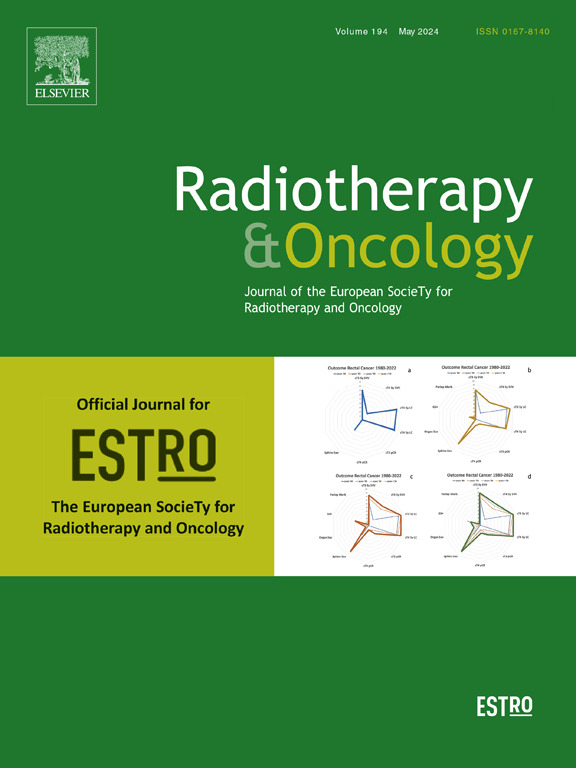Impact of bra application in breast cancer radiotherapy: A pilot prospective randomized trial
IF 4.9
1区 医学
Q1 ONCOLOGY
引用次数: 0
Abstract
Purpose
This prospective, randomized clinical trial evaluated the effects of bra-wearing during radiotherapy on breast-shape reproducibility, dosimetry, and treatment toxicities in patients with breast cancer.
Methods
Thirty-eight patients with breast cancer who underwent breast-conserving surgery were randomly assigned to bra-wearing or non-wearing groups during radiotherapy. Breast-shape reproducibility was assessed using daily cone-beam computed tomography (CBCT). The primary outcome was breast-shape reproducibility, evaluated by the nipple-to-pectoral muscle distance (ΔNPD) and mean surface distance (MSD), comparing daily CBCT to planning CT. We calculated the mean root-mean-squared error (ε), systematic error (Σ), and random error (σ). Secondary outcomes included dosimetric parameters and acute/subacute toxicities.
Results
ΔNPD ε (1.0 mm vs 3.8 mm, P < 0.001), Σ (0.6 mm vs 3.6 mm, P < 0.001), and σ (0.8 mm vs 2.2 mm, P < 0.001) were significantly smaller in the bra-wearing group. For larger breasts (cup sizes C–D), MSD ε was significantly smaller in the bra-wearing group (1.1 mm vs. 2.1 mm, P = 0.006), but not for smaller breasts. The absolute ΔNPD exceeded 3 mm in 0.4 % of CBCT scans in the bra-wearing group and 48.1 % in the non-wearing group (P < 0.001). Absolute MSD exceeded 3 mm in 2.1 % and 10.0 % of scans in the bra-wearing and non-wearing groups, respectively (P < 0.001). No significant differences were observed in lung and heart dosimetric outcomes between groups. Grade 2 or higher toxicities were minimal in both groups.
Conclusion
The use of a bra during radiotherapy enhances breast-shape reproducibility, particularly in patients with larger breasts, without increasing treatment toxicities.
Trial Registration Number: NCT06178861.
佩戴胸罩对乳腺癌放疗的影响:前瞻性随机试验
本文章由计算机程序翻译,如有差异,请以英文原文为准。
求助全文
约1分钟内获得全文
求助全文
来源期刊

Radiotherapy and Oncology
医学-核医学
CiteScore
10.30
自引率
10.50%
发文量
2445
审稿时长
45 days
期刊介绍:
Radiotherapy and Oncology publishes papers describing original research as well as review articles. It covers areas of interest relating to radiation oncology. This includes: clinical radiotherapy, combined modality treatment, translational studies, epidemiological outcomes, imaging, dosimetry, and radiation therapy planning, experimental work in radiobiology, chemobiology, hyperthermia and tumour biology, as well as data science in radiation oncology and physics aspects relevant to oncology.Papers on more general aspects of interest to the radiation oncologist including chemotherapy, surgery and immunology are also published.
 求助内容:
求助内容: 应助结果提醒方式:
应助结果提醒方式:


